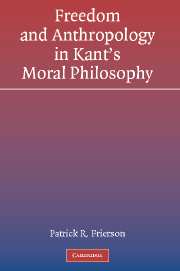Book contents
- Frontmatter
- Dedication
- Contents
- Preface
- Introduction: A Problem with Kant’s Moral Anthropology
- I The Problem
- 1 The Asymmetry in Kant’s Conception of Freedom
- 2 Anthropology as an Empirical Science
- 3 The Moral Importance of Kant’s “Pragmatic” Anthropology
- 4 Moral Anthropology in Contemporary Neokantian Ethics
- II The Solution
- 5 Transcendental Idealism, Radical Evil, and Moral Anthropology
- 6 Moral Influence on Others
- Epilogue: Incorporating Moral Anthropology and Defending Kantian Moral Philosophy
- Notes
- References
- Index of Kant’s Works
- Name Index
- Subject Index
Introduction: A Problem with Kant’s Moral Anthropology
Published online by Cambridge University Press: 28 July 2009
- Frontmatter
- Dedication
- Contents
- Preface
- Introduction: A Problem with Kant’s Moral Anthropology
- I The Problem
- 1 The Asymmetry in Kant’s Conception of Freedom
- 2 Anthropology as an Empirical Science
- 3 The Moral Importance of Kant’s “Pragmatic” Anthropology
- 4 Moral Anthropology in Contemporary Neokantian Ethics
- II The Solution
- 5 Transcendental Idealism, Radical Evil, and Moral Anthropology
- 6 Moral Influence on Others
- Epilogue: Incorporating Moral Anthropology and Defending Kantian Moral Philosophy
- Notes
- References
- Index of Kant’s Works
- Name Index
- Subject Index
Summary
Kant's Anthropology and Schleiermacher's Objection
In 1798, Immanuel Kant published his Anthropology from a Pragmatic Point of View. In this work, he discusses “what man makes, can, or should make of himself” (7:119). The book offers detailed, even if incomplete, accounts of human capacities and character, and these accounts help flesh out Kant's Critical philosophy with empirical information about human beings. This 1798 Anthropology was not Kant's first foray into anthropology. Starting in 1772, Kant offered yearly lectures on anthropology that parallel the published work. In addition, anthropological insights are scattered throughout Kant's other publications. The essays on history (primarily from 1784 to 1786), the third Critique (1790), Religion within the Boundaries of Mere Reason (1793), and the Metaphysics of Morals (1797)all present various aspects of Kant's anthropology. But the Anthropology of 1798 is the most detailed, systematic, and public treatment of anthropological issues in Kant's corpus.
Within a year and a half of its publication, at least eleven reviews of Kant's Anthropology appeared. Among these was an important review by a young Friedrich Schleiermacher, published in the Romantic journal Athaeneaum. In his review, Schleiermacher sarcastically suggests that Kant's Anthropology must have been intended as a “negation of all anthropology” (Schleiermacher 1984: v.1, p. 366, cf. Schleiermacher 1998) because it blatantly conflicts with the rest of Kant's philosophy. The review criticizes the Anthropology for disorganization and triviality and accuses Kant of failing to combine systematicity and popularity in it. But the most philosophically important objection comes in the form of a challenge to Kant to choose between his anthropology and his theory of freedom, insisting that Kant cannot have both.
The conflict is between two claims, that “nature is choice” and that “choice is nature” (Schleiermacher 1984: v.1, p. 366). Kant's anthropology, according to Schleiermacher, must affirm that “choice is nature.” That is, human beings and all their choices must be considered objects in nature if they are to be studied by anthropology. But Kant must also affirm that “nature is choice” – that is, that an individual's human nature is due to that individual's choice. The “nature” that anthropology studies cannot be merely the result of natural causes. Schleiermacher gives two reasons for insisting that Kant must reconcile his anthropology with this strong claim about freedom.
- Type
- Chapter
- Information
- Freedom and Anthropology in Kant's Moral Philosophy , pp. 1 - 10Publisher: Cambridge University PressPrint publication year: 2003



